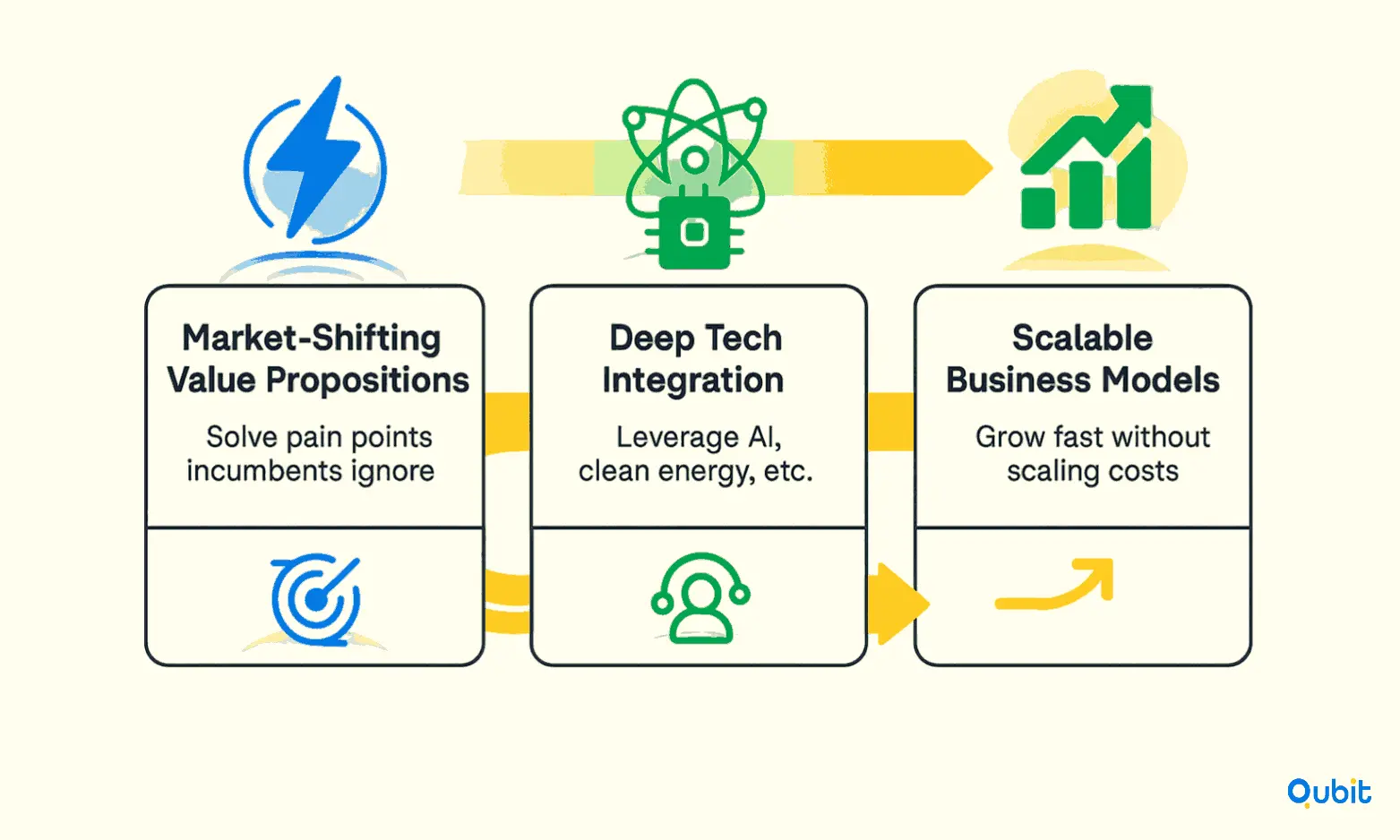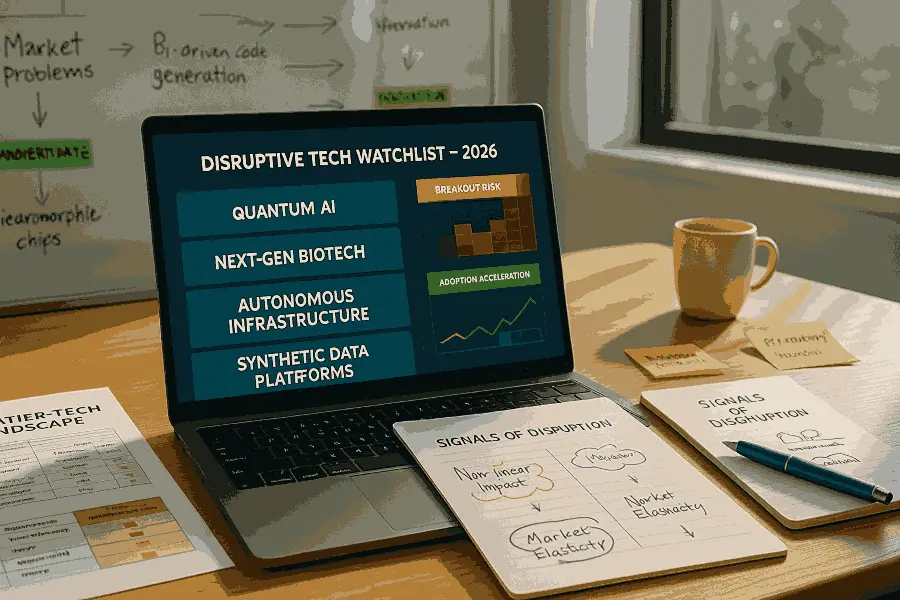The rapid evolution of technology continues to redefine industries, with startups often at the forefront of this transformation. Identifying disruptive technologies early can be challenging, especially when traditional search terms fail to capture emerging trends.
As disruptive innovation accelerates, AI startups funding $110 billion in 2024 shows a dramatic pivot. This surge occurred despite a 12% decline in overall startup funding. Investors and leaders must adapt strategies accordingly.
From analyzing case studies to leveraging tools that track startup trends, this guide provides actionable insights for recognizing technologies that challenge the status quo. Prepare to uncover the methodologies that drive success in identifying the next wave of innovation.
Fundamental Characteristics of Disruptive Innovation in Startups
Startups that redefine industries often share a set of transformative traits. These characteristics enable them to challenge established norms and create entirely new market dynamics. At the heart of this disruption lies their ability to identify overlooked inefficiencies and address them with groundbreaking solutions.

1. Unique Value Propositions that Reshape Markets
Disruptive startups excel at offering value propositions that traditional players fail to address. They focus on solving specific pain points or delivering enhanced convenience, often at a lower cost. For instance, many cleantech startups are revolutionizing energy consumption by providing sustainable alternatives that are both cost-effective and environmentally friendly. These solutions not only attract underserved market segments but also force incumbents to rethink their strategies.
2. Cutting-Edge Technological Advancements
The adoption of state-of-the-art technologies is another hallmark of disruptive startups. Whether it's artificial intelligence, blockchain, or renewable energy innovations, these companies harness technology to create products and services that were previously unimaginable. In the cleantech sector, for example, advancements in solar panel efficiency and energy storage are enabling startups to challenge fossil fuel-based energy systems. By integrating such technologies, these businesses redefine what is possible within their industries.
3. Scalable Business Models for Rapid Growth
Scalability is a critical factor in the success of disruptive startups. Their business models are designed to grow quickly without a proportional increase in costs. This scalability allows them to capture market share rapidly and outpace competitors. For instance, subscription-based models or platform-based ecosystems often enable startups to expand their reach while maintaining operational efficiency.
Your exploration of disruptive startup technologies is framed by startup scouting strategies, offering a structured context that complements advanced evaluation methods. By understanding these strategies, investors and industry leaders can better anticipate shifts that reshape markets and create new opportunities.
Market Analysis and Potential Impact
Market momentum has shifted sharply. In 2025, AI startups attracted $89.4 billion, comprising 34% of all venture investment despite being just 18% of funded companies. This reveals outsized investor confidence in disruptive capability, guiding early market analysis.
Disruptive startups often thrive by identifying untapped opportunities within expansive, addressable markets. These companies excel at scaling rapidly, a capability that allows them to meet growing consumer demands while staying ahead of competitors. Understanding market dynamics, such as shifts in consumer preferences and emerging regulatory frameworks, can provide early indicators of a startup's breakthrough potential.
The Role of Market Dynamics
Consumer demand is rarely static. Startups that succeed in high-growth markets are those that anticipate and adapt to these shifts. For instance, the rise of eco-conscious consumers has spurred demand for sustainable products, creating opportunities for startups to disrupt traditional industries. Similarly, regulatory changes, such as data privacy laws, can open doors for innovative solutions in compliance and cybersecurity.
Importance of Robust Market Research
Thorough market research is the backbone of identifying high-growth opportunities. A discussion centered around startup market analysis tools contributes a market research perspective that enriches your examination of disruptive startup trends. These tools not only help in evaluating market size but also in understanding competitive landscapes and consumer behavior patterns. By leveraging such insights, startups can position themselves strategically to address unmet needs.
Early Indicators of Disruption
Spotting early signs of disruption involves analyzing trends and consumer pain points. For example, industries with outdated processes or inefficiencies often present fertile ground for innovation. Startups that address these gaps with scalable solutions can achieve rapid adoption and long-term success.
By focusing on robust market research and staying attuned to evolving market dynamics, startups can uncover opportunities that others may overlook.
Leadership, Team, and Business Model Innovation
Visionary leadership and cohesive team dynamics are the cornerstones of successful business model innovation. Companies that challenge industry norms often rely on leaders who inspire creativity and teams that collaborate seamlessly. Together, they create the foundation for implementing disruptive strategies, such as subscription-based services or decentralized platforms, which redefine market expectations and deliver sustainable competitive advantages.
The Role of Leadership in Driving Innovation
Effective leadership is not just about setting goals; it’s about fostering an environment where innovation thrives. Leaders who prioritize adaptability and encourage calculated risks empower their teams to experiment with unconventional ideas. For instance, the rise of subscription-based services across industries, from entertainment to software, was driven by leaders who recognized the value of recurring revenue models over traditional one-time sales.
Moreover, leaders who embrace transparency and open communication build trust within their teams, enabling faster decision-making and smoother execution of innovative strategies. This approach ensures that even the most disruptive ideas are met with enthusiasm and commitment.
Building Teams for Disruption
A cohesive team is more than a group of skilled individuals; it’s a collective force aligned toward a shared vision. Startups and established companies alike benefit from assembling diverse teams with varied perspectives, as this diversity fuels creativity and problem-solving.
For example, decentralized platforms like blockchain-based ecosystems require cross-functional teams that understand both technology and market dynamics. These teams must collaborate to address challenges such as scalability and user adoption while maintaining the platform’s core value proposition.
Business Models That Redefine Industries
Innovative business models are the ultimate outcome of strong leadership and effective teamwork. Strategies like freemium pricing, platform-based ecosystems, and direct-to-consumer (DTC) approaches have disrupted traditional industries by offering unique value to customers.
Take the example of decentralized finance (DeFi) platforms, which have reimagined financial services by eliminating intermediaries. These platforms thrive on the synergy between visionary leaders who set the strategic direction and teams that execute complex technical solutions.
By fostering a culture of innovation and collaboration, businesses can not only adapt to changing market conditions but also set new benchmarks for their industries.
Leading teams adopt bold models that attract higher valuations. AI startup average valuations 3.2x higher than traditional tech, per PwC. Strong leadership and innovation enable this premium, driving sector-wide investment.
Aligning Go-to-Market Strategy with Product Innovation
Building on innovative business models, disruptive startups must develop their go-to-market strategy alongside product innovation. This approach ensures that customer discovery, pricing, and sales processes evolve with the technology. By aligning these elements early, startups can better educate the market and address adoption barriers. This strategic integration helps avoid common pitfalls and accelerates the path to market traction.
Early Stage Indicators and Funding Patterns
Identifying the disruptive potential of a startup often begins with evaluating early traction metrics and customer validation. These indicators provide a glimpse into the startup's ability to address market needs effectively. For instance, Earth Foundry, a cleantech-focused organization, has reviewed over 10,000 startup applications, showcasing the scale of their screening process and their commitment to identifying technical breakthroughs.
Earth Foundry’s structured screening process ensures that only startups demonstrating genuine user validation and product-market fit are advanced to the next funding stage.
The Role of Structured Screening Processes
A structured approach to evaluating startups ensures that only the most promising ventures move forward. At Earth Foundry, each team member reviews approximately 1,800 innovations annually, equating to about 30 per week. This rigorous process not only highlights their deep sector insights but also underscores the importance of fixed milestones in mitigating investment risks. These milestones act as checkpoints, ensuring startups remain on track while providing investors with measurable progress indicators.
Funding Patterns and Risk Mitigation
Robust funding rounds serve as another critical marker of a startup's potential. Diversified exit strategies further reduce risks, offering investors multiple pathways to realize returns. A review of competitive analysis for startup investing reveals how assessing market voids can illuminate startups addressing unmet needs. This approach complements early-stage metrics by identifying startups that exploit inefficiencies or gaps in the market.
By combining early traction metrics, structured screening processes, and strategic funding patterns, investors can better predict which startups are poised for success while minimizing risks.
Latest Initiatives and Identification Methodologies
Spotting disruptive startups requires a blend of advanced technology and human insight. Modern strategies, such as AI-driven analytics, accelerator programs, and crowdsourced innovation platforms, are reshaping how investors identify high-potential ventures. By combining quantitative data with qualitative insights from academic research, patent filings, and industry conferences, these methodologies offer a comprehensive approach to detecting emerging trends.
1. AI-Driven Analytics: Precision in Startup Scouting
AI-powered tools are revolutionizing the way investors analyze market trends and evaluate startup performance. For example, AI-driven platforms by Sequoia Capital are designed to filter through thousands of startups, assessing their readiness and scalability. These platforms analyze vast datasets, including consumer behavior and market dynamics, to pinpoint startups with the highest growth potential. By integrating such tools, investors can streamline their decision-making processes and focus on ventures that align with their strategic goals.
For a deeper dive into how AI solutions enhance deal sourcing, explore our insights on data platforms for startup scouting.
2. Crowdsourced Innovation Platforms: Expanding Deal Flow
Crowdsourcing has emerged as a powerful method for identifying innovative startups. Platforms like OurCrowd connect accredited investors with vetted startups, creating a global network for crowdsourced innovation. This approach not only broadens deal flow but also taps into diverse perspectives, enabling investors to discover opportunities they might otherwise overlook. By leveraging the collective intelligence of a global community, platforms like these ensure a steady pipeline of groundbreaking ideas.
3. Holistic Insights: Beyond the Numbers
While data analytics and crowdsourcing provide valuable quantitative insights, qualitative factors remain equally critical. Academic research, patent filings, and industry conferences offer unique perspectives on emerging technologies and market shifts. These sources help investors understand the broader context of a startup’s potential, ensuring that decisions are informed by both hard data and nuanced insights.
By combining cutting-edge tools with traditional research methods, investors can stay ahead of the curve and identify the next wave of disruptive startups.
Modular Architectures and Incremental Testing for Technology Adoption
- Design applications with separate layers for user interface, business logic, and data management to isolate changes and speed up integration.
- Implement feature flags to enable incremental testing of new technologies, allowing rapid rollbacks if issues arise during deployment.
- Adopt modular architectures to minimize risk, making it easier to update or replace components as disruptive innovations emerge.
Case Studies and Examples of Disruptive Startups
Disruptive startups often challenge the status quo, introducing innovative solutions that redefine industries. By examining real-world examples, we can uncover the strategies and technologies that drive their success. Global impact accelerates beyond cleantech and recycling. Mistral AI exemplifies disruption, raising over $650 million and achieving a $2 billion valuation inside twelve months. Their swift fundraising and scale position them as an industry-defining force.
Below are two standout case studies showcasing how startups are reshaping sectors like renewable energy and recycling.
1. e-Zinc: Revolutionizing Renewable Energy Storage
e-Zinc, a Canadian climate tech venture, has emerged as a pioneer in renewable energy storage. The company focuses on long-duration energy storage technology, addressing critical challenges in sustainability. By enabling energy to be stored for extended periods, e-Zinc’s innovation supports the transition to cleaner energy grids.
This startup exemplifies how early adoption of groundbreaking technology can solve pressing global issues. With investment from Earth Foundry, e-Zinc demonstrates how collaboration with established networks can accelerate growth and market validation.
2. Polystyvert: Transforming Polystyrene Recycling
Polystyvert is another Canadian climate tech venture making waves, this time in the recycling industry. Specializing in polystyrene recycling, the company has developed a unique process that significantly improves the efficiency and scalability of recycling operations. Supported by Earth Foundry, Polystyvert showcases how innovative recycling solutions can thrive through strategic partnerships.
This case study highlights the importance of addressing environmental challenges with scalable solutions. Polystyvert’s success underscores the potential of startups to create sustainable systems while achieving commercial viability.
Regulatory and Compliance Considerations
Disruptive startups often thrive on innovation, but their success hinges on navigating complex regulatory landscapes. Industries like fintech, healthcare, and artificial intelligence (AI) are particularly sensitive to compliance requirements, where adherence to regulations can shape investor confidence and competitive positioning.
1. The Role of Data Privacy in Fintech
In fintech, stringent data privacy measures are not just legal obligations, they are essential for building trust with users and stakeholders. Startups that prioritize compliance with frameworks such as GDPR or CCPA demonstrate their commitment to safeguarding sensitive financial information. This proactive approach can attract investors who value risk mitigation and long-term stability.
2. Intellectual Property Protection in AI
For AI startups, intellectual property (IP) protection is a cornerstone of competitive advantage. Securing patents for proprietary algorithms or machine learning models not only shields innovations from competitors but also enhances valuation during funding rounds. Investors often view robust IP portfolios as indicators of a startup’s potential for scalability and market dominance.
3. Healthcare Compliance: A Non-Negotiable
Healthcare startups face some of the most stringent regulatory requirements, including HIPAA compliance for patient data and FDA approvals for medical devices. Meeting these standards is critical not only for legal operation but also for establishing credibility in a highly regulated sector. Startups that successfully navigate these hurdles often find themselves better positioned to secure funding and partnerships.
Understanding how regulatory changes correlate with investor confidence can be crucial for startups. Insights on how to track startup funding news provide context for identifying market signals tied to compliance strategies.
By embedding compliance into their operational frameworks, startups can transform regulatory challenges into opportunities for differentiation and growth.
Future Outlook and Emerging Trends
The horizon of disruptive startup technologies is brimming with transformative possibilities. From agentic AI to quantum computing, advanced robotics, and 6G connectivity, these innovations are poised to redefine industries and consumer experiences. Staying ahead in such rapidly evolving markets demands continuous monitoring of deep tech advancements and shifting consumer demands.
1. Agentic AI: A New Era of Autonomy
Agentic AI represents a leap forward in artificial intelligence, enabling systems to make independent decisions based on complex data inputs. This emerging trend is set to revolutionize industries such as healthcare, finance, and logistics by enhancing operational efficiency and decision-making capabilities. Early breakthroughs in this space can be identified years before competitors by reviewing a high volume of startup applications. This underscores the advantage of scanning thousands of emerging ventures to spot patterns early.
2. Quantum Computing: Unlocking Unprecedented Computational Power
Quantum computing is transitioning from theoretical research to practical applications, offering unparalleled computational capabilities. Startups in this domain are exploring solutions for cryptography, drug discovery, and optimization problems that were previously unsolvable. As quantum technology matures, its potential to disrupt traditional computing paradigms becomes increasingly evident.
3. Advanced Robotics: Redefining Automation
The field of robotics is advancing rapidly, with startups developing machines capable of performing intricate tasks across industries. From manufacturing to healthcare, advanced robotics is reshaping how businesses operate. These innovations are not only improving efficiency but also opening doors to entirely new applications, such as robotic surgery and autonomous delivery systems.
4. 6G Connectivity: Beyond Speed
While 5G is still being adopted globally, the groundwork for 6G connectivity is already underway. This next-generation network promises to deliver unprecedented speeds, lower latency, and enhanced reliability. Startups focusing on 6G are exploring applications in augmented reality, virtual reality, and IoT ecosystems, setting the stage for a hyper-connected future.
5. Circular Economy Momentum
The rise of circular economy initiatives is reshaping cleantech paradigms. Startups tackling waste concerns at scale are gaining traction by addressing pressing environmental challenges. Reuse and recycling efforts are not only attracting investor attention but also driving sustainable innovation across industries.
Creativity and STEAM Education as Drivers of Disruption
Beyond technical expertise, sustainable disruption relies on creativity and interdisciplinary skills fostered by STEAM education. This approach encourages human-centric innovation that addresses real-world needs and adapts to changing markets. By integrating arts with science and technology, startups can differentiate themselves and avoid commoditization. Emphasizing creative problem-solving ensures long-term relevance in rapidly evolving industries.
Emerging technologies like agentic AI and quantum computing are not just trends, they are catalysts for market-shaping disruption. By anticipating disruptive technological innovations, businesses can position themselves at the forefront of change and capitalize on opportunities before competitors.
Conclusion
Identifying disruptive startups requires more than just intuition—it demands a structured, narrative-driven approach. Throughout this blog, we’ve explored strategies that emphasize clarity, data-driven insights, and the importance of storytelling in uncovering innovation. By focusing on these elements, investors can better position themselves to recognize and support transformative ventures.
At Qubit Capital, we understand the challenges of scouting groundbreaking startups. That’s why we offer our Startup Scouting service, designed to provide tailored, data-driven insights for your investment journey. If you're ready to discover the next wave of innovation, we invite you to explore how our expertise can help you stay ahead.
Key Takeaways
- Disruptive startups transform traditional markets through innovative technology and scalable business models.
- Robust market analysis and early-stage metrics are essential for identifying high-potential ventures.
- Visionary leadership and cohesive team dynamics drive sustainable competitive advantages.
- Cutting-edge methodologies, including AI-driven tools and crowdsourced insights, enhance startup scouting.
Frequently asked Questions
How do data-driven methods help in identifying disruptive startup technologies?
Data-driven methods use analytics, market research, and structured screening to reveal emerging disruptive startups in fast-evolving industries.






